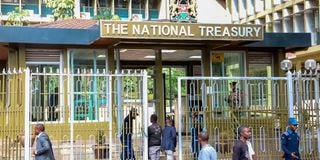Premium
Inside Kenya’s costly Sh1.6trn infrastructure bonds binge

The National Treasury building in Nairobi in this picture taken on March 15, 2023. PHOTO | DENNIS ONSONGO | NMG
The Treasury is foregoing at least Sh23.5 billion annually in tax incentives to entice buyers of infrastructure bonds (IFBs), which have emerged as the easiest path to the domestic debt market for the government.
Infrastructure bonds carry a tax-free status, in contrast to other government securities which are levied a withholding tax of 10 percent for those of a tenor of more than five years and 15 percent for those of five years and below.
The tax incentive has made these bonds popular with investors, with the government taking advantage of the heavy bidding to raise a large share of its domestic borrowing target from the project bonds.
Incidentally, the bonds have also been sold at the highest interest rates relative to other securities.
Overall, Kenya has Sh1.66 trillion worth of outstanding infrastructure bonds on its books, representing 39 percent of the Sh4.27 billion total outstanding value of Treasury bonds currently in issue.
The annual coupon (interest) payments on these IFBs stand at Sh235.5 billion, which would earn at least Sh23.5 billion if they were to be levied a withholding tax.
The tax incentive, according to fixed-income analysts, was put in place to help the government raise investor appetite for the bonds, whose proceeds are meant to be channelled to specific infrastructure projects identified for financing under the budget.
“The IFBs come in handy for the government, because when you are in a fiscal squeeze, the easiest way to raise the necessary funding is such a bond that comes with tax-free status,” said a fixed-income trader, who asked for anonymity due to dealings with the Treasury.
“The main concern though on the bonds is the lack of transparency in the distribution of proceeds to specific projects, which denies the taxpayer the comfort of knowing whether they are getting value for money to compensate for the foregone taxes.”
This is even as IFBs outperform ordinary fixed-term bonds in terms of amounts raised and the returns on offer to investors. In the recent sale of an 8.5-year IFB, investors offered the government Sh288.7 billion, out of which it took up Sh240.9 billion at a rate of 18.46 percent.
In November 2023, the State raised Sh112.73 billion from a 6.5-year IFB at a rate of 17.93 percent, while in June 2023, it raised Sh213.3 billion from a seven-year IFB at 15.84 percent.
Meanwhile, the highest rate on offer for an ordinary fixed-term bond since June 2023 is the 18.77 percent paid on a reopened five-year paper sold in January 2024, which when adjusted for withholding tax offers a net return of 15.9 percent.
When the government sold its first IFB in February 2009, targeting Sh18.5 billion with a 12-year tenor, it earmarked Sh4.15 billion for water, sewerage and irrigation projects, Sh6.44 billion for roads projects and Sh7.91 billion for energy projects.
A second IFB was sold in December 2009 —also targeting Sh18.5 billion with a 12-year tenor— with the prospectus issued at the time offering details of projects and the number of areas that would benefit from them.
For instance, it showed that 186 districts would share Sh1.49 billion for the construction of water supplies, 57 districts would get Sh2.9 billion for water conservation and construction of dams, and 29 districts would share Sh78 million for sewerage works.
A further Sh5 billion was lined up for the construction of new roads in 23 districts, and Sh4 billion towards refurbishment and overhaul of civil works in 44 districts.
In the energy sector, geothermal exploration was allocated Sh3.5 billion, while Sh1.53 billion went into rural electrification in 130 districts.
Recent IFB issues have on the other hand carried fewer details on the projects they are meant to fund. The prospectus for the February sale, for instance, indicated that the proceeds would be used for funding of infrastructure projects in the 2023/2024 fiscal year budget estimates.





